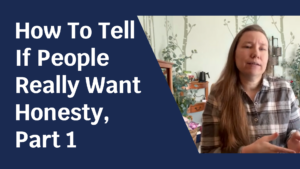
Practical Tips for Disclosing Your Autism
How to approach the “I’m Autistic” conversation so it goes better, and coping when it doesn’t.

How to approach the “I’m Autistic” conversation so it goes better, and coping when it doesn’t.

Anxiety and sensory stuff can be difficult to pick apart, so I’d like to talk a bit about them and how they can intersect.

A few comments about four mental health myths that I’ve seen play out pretty consistently over the years.

Healing communication wounds with new experiences is a gradual process.

Once you discover your autism, you may realize just how severed the connection to yourself is, but it is possible to get in touch with yourself; to learn to trust your instincts better.

For autistics, it makes sense why we tend to avoid social situations; the majority of our interactions can be uncomfortable. But we can’t lean into the discomfort until we stop shaming ourselves.

Accountability partners is a popular concept, designed to keep us accountable to someone else in order to create motivation to get things done, but I have a different opinion.

Why thank you notes work might surprise you. Rather than relics of the past, these tools still serve an important purpose.

How social pressures shape our lives, and then people assume that’s what we wanted.

Sometimes when we unmask our autism, other people will have big reactions and get really upset, and we might think that we have to go back to masking because of that. But here’s a third option.

I never understood why I get mad when people compliment my smile.

When going through a tough time, it’s easy to feel like it’s the end of everything, but this isn’t the end of your story.

Here are a few questions about interpersonal relationships and your autism journey that may spark some ideas.

I’ve been thinking about something I wrote for a friend’s daughter a couple years ago.

How do you tell if people really want honesty or not? Here are a few tips, and some relief for when you get it wrong.
We don’t spam or sell. Promise. Unsubscribe at any time.
Read our privacy policy here.
Privacy Policy Heather’s Boundaries (T&C)
The information on this site is not intended or implied to be a substitute for psychotherapy, medical advice, diagnosis, or treatment.
© 2020-2024 Autism Chrysalis LLC.